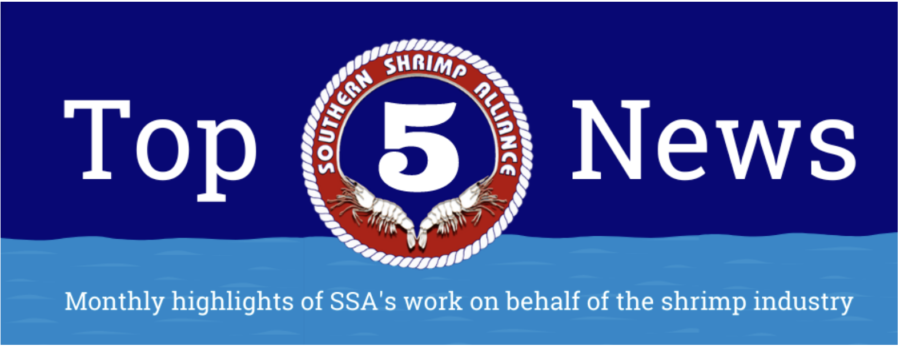

The LESS Act Increases Usefulness of Duties to U.S. Shrimpers
SSA helped draft a federal bill that, if passed, would generate funding in an amount equal to 70% of duties collected by the U.S. Treasury on dumped imported shrimp to:
(1) fund increased FDA testing of shrimp imports for illegal antibiotics;
(2) substantially increase USDA Section 32 purchases of domestic shrimp; and,
(3) combat illegal, unreported, and unregulated (IUU) fishing in seafood supply chains.
In July, Congressman Garret Graves (R-LA) and Congresswoman Kathy Castor (D-FL) introduced the bipartisan bill.
Why This Matters
- Most major markets find and destroy antibiotic-laden shrimp. Yet, the U.S. government rarely tests shrimp imports. Therefore, contaminated shrimp that can’t be sold elsewhere compete with wholesome wild-caught U.S. shrimp. Better FDA enforcement offers long-term relief for shrimpers while fighting antibiotic abuse that threatens U.S. consumer health.
- SSA supports the USDA’s Section 32 program because government purchases of U.S. shrimp will help to alleviate the oversupply of cheap imported shrimp in U.S. inventory causing U.S. shrimpers to remain tied to the dock for lack of a market. Domestic shrimp prices will benefit from a new market while providing healthy meals to schools and prisons.
- U.S. shrimpers should never compete against slave labor. The bill SSA worked to have introduced significantly strengthens federal agencies’ capacity to combat forced labor in seafood supply chains.

SSA Submits Comments on Commerce's Proposed Amendments to its Antidumping Regulations
SSA expressed support for the Commerce Department’s efforts to strengthen enforcement of the antidumping duty laws in comments filed in July. It also observed that Commerce has routinely declined to exercise the authority already granted to it by Congress to account for dumping entirely. Some of Commerce’s proposed regulatory amendments would make it more difficult for SSA to demonstrate when the agency fails to follow the requirements of U.S. law.
Why This Matters
Over the last several years, Commerce has used its discretionary authority to minimize antidumping duties on Indian shrimp. U.S. shrimpers need unfair trade to be countered completely through antidumping duty orders. SSA will continue to advocate for robust enforcement of our trade laws.

New Funding Slated for Electronic Logbooks
In July, the Senate Appropriations Committee adopted its Appropriations Bill and Report that will fund NOAA in 2024. At SSA’s request, the Committee report includes an additional $850,000 for NOAA to develop modern Electronic Logbooks (ELBs) that archive vessel positions and automatically transmit scientific shrimp fishing effort data via cellular service to NMFS.
Developing a replacement for 3G ELBs has been a priority for SSA, which secured the same funding amount last year. The funding language in the Committee Report is a significant step forward in the 2024 appropriations process.
Why This Matters
- If shrimp effort data is not collected, the fishery will literally lose access to the Gulf of Mexico. Compliance with the regulatory requirements of the Endangered Species Act and the Magnuson-Stevens Act require the data
collected by ELBs. - Also, ELB data is used to avoid conflicts between the shrimp fishery and offshore wind energy and aquaculture development.
- 3G cellular technology became obsolete in 2020, so a replacement must be developed. However, shrimpers have concerns about the proposed Vessel Monitoring System (VMS) replacements now being tested. SSA is consulting with NOAA through the Shrimp Advisory Panel and Gulf Council to find the most effective and cost-efficient solution.

The U.S. Should Promote Domestic Seafood, Not Imports
NOAA should not use U.S. tax dollars to promote the consumption of seafood imports that devastate America’s fishing communities. At SSA’s request, Senator Cindy Hyde-Smith (R-MS) inserted language into the Senate Appropriations Act 2024 to prevent NOAA from using taxpayer dollars to fund policies or programs that promote the U.S. consumption of seafood imports.
Why This Matters
- Believe it or not, NOAA supports a seafood marketing campaign the Seafood Nutrition Partnership advanced to promote U.S. seafood consumption—including imported seafood. These mega-seafood importers and restaurant chains seek $25 million per year for five years ($125 million) from Congress.
- Senator Hyde-Smith is a member of the Senate Appropriations Committee. On behalf of the shrimp industry, she sent a powerful message that using taxpayer dollars to promote American consumption of foreign seafood is unacceptable. The language prohibiting the spending outlines the antibiotic, labor, and trade abuses of imported seafood and the damage it causes to domestic fisheries.
Appeal Won
Commerce ordered Customs and Border Protection to collect 58.96% antidumping duties on Shantou Red Garden. Previously, these Chinese shrimp imports entered the U.S. duty-free.

SSA Asks for Public Disclosure of Shipment Information
In response to their request for comments on existing trade laws, SSA asked Senators for the public disclosure of manifests for shipments that arrive in the United States through truck, rail, or air. The lack of public disclosure regarding truck or rail shipments has created large gaps in SSA’s ability to track and monitor imports.
Why This Matters
- Under current law, the government publicly releases only ship manifest data. SSA uses that data to identify shrimp transshipped to evade U.S. trade laws.
- Information regarding shipments of shrimp that enter the United States through Canada or Mexico by truck or rail is sparse.
- The public release of all shipment data would help to eliminate one of the last remaining methods for evading U.S. trade laws.
GOVERNANCE UPDATE
New Directors Welcomed to SSA's Board
The general membership of SSA voted on SSA’s Board of Directors in July. The new and returning members will take office in August.
SSA is governed by a volunteer Board of Directors. The Board is composed of two elected representatives from each of the eight member-states, two Vietnamese-American Representatives, and two Business Committee representatives.
Nominations to serve on SSA’s Board are always open and ongoing. All of SSA’s members are eligible for the Board and should express interest in serving and learn of the commitment and responsibilities by speaking with John Williams at 727-934-5090 or via email. The slate
of candidates is presented to members. Write-in candidates are welcome on each state’s ballot.
The Board sets policy and financial goals through majority rule decision-making. The SSA has a small staff to implement Board decisions. It employs a full-time Executive Director and Executive Assistant.
